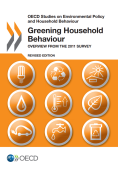Economic incentives such as environmental taxes can create attractive markets for environmentally sound products and process technologies. Many European countries have a long tradition with environmental taxes but recent figures indicate that the share of green tax revenues in the EU-15 GDP is slightly declining. This is surprising since several governments had declared they would gradually shift the fiscal burden from labour to pollution. This paper tries to explain the fiscal inertia by analysing the role of the taxation base, fiscal neutrality, government failure with respect to the use of economic instruments and the dependence of government budgets on consumption-driven economic growth. The paper concludes that the initial focus on the double dividend hypothesis has strongly limited the impact of green taxes. A green tax reform based on consumption taxes that are differentiated according to the environmental impact of products could be more effective and efficient.

Developing growth strategies that promote greener lifestyles requires a good understanding of what factors affect people’s behaviour towards the environment. Recent OECD work based on periodic surveys of more than 10, 000 households across a number of countries and areas represents a breakthrough by providing a common framework to collect unique empirical evidence for better policy design.
This publication presents responses from the most recent round of the OECD survey implemented in 2011 in 5 areas (energy, food, transport, waste and water) and 11 countries: Australia, Canada, Chile, France, Israel, Japan, Korea, the Netherlands, Spain, Sweden and Switzerland.
Analysis comparing the data across countries, policy conditions and households’ characteristics reveals which measures most effectively change behaviour. Each round of the survey also allows to track changes over time and to explore new emerging issues.
The environmental and health sciences have brought important insights into the connection of environmental pressures and ecosystem damages. Well-known assessments show that habitat change, the overexploitation of renewable resources, climate change, and particulate matter emissions are amongst the most important environmental problems. Biodiversity losses and ill health have been estimated and evaluated.
This report focuses not on the effects of environmental pressure, but on its causes. It describes pressures as resulting from economic activities. These activities are pursued for a purpose, to satisfy consumption. Environmental pressures are commonly tied to the extraction and transformation of materials and energy. This report investigates the production-materials-consumption nexus.
The document provides guidance principles for Life Cycle Assessment (LCA) databases; this includes how to collect raw data, how to develop datasets and how to manage databases. The publication also addresses questions concerning data documentation and review, coordination among databases, capacity building and future scenarios. LCA databases provide fundamental energy, materials, land, water consumption data and emissions data into water, air and soil for a wide range of processes, products and materials. In this way, the publication provides the bridge between the data users and the data providers, making basic information easily accessible for computing the environmental footprints of materials and products that are key to make and judge green claims and to allow institutional and individual consumers to make informed consumption choices.
The document is the output of the UNEP/SETAC "Global Guidance for LCA Databases" workshop, (30 January - 4 February 2011, Shonan, Japan), also known as the ‘Shonan Guidance Principles’ workshop.
Green economy/green growth is a new terminology for what has been known for 40 years as ecological modernisation, however with its focus on efficiency and innovation it cannot guarantee to fulfil the Brundtland sustainability criteria. A factor analysis based on the I ¼ P*A*T formula demonstrates how optimistic the assumptions regarding future technologies must be to support the green growth concept. Consequently, the authors pledge for a pragmatic, risk avoiding approach by slimming the physical size of the economy. This requires ‘strong sustainable consumption’ (including production as resource consumption), which in turn requires a change of the societies’ institutional settings (formal and informal, mechanisms and orientations). Finally some elements of a strategy towards this end are pointed out, with special emphasis on the role of non-governmental organisations (NGOs). Through networking and advocacy they can both stimulate bottom-up action and mobilise the pressure necessary for the institutional changes which are needed to mainstream strong sustainable consumption.
